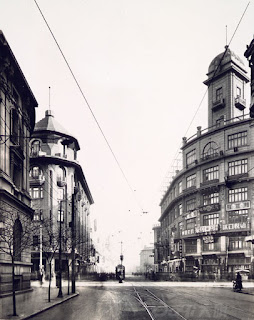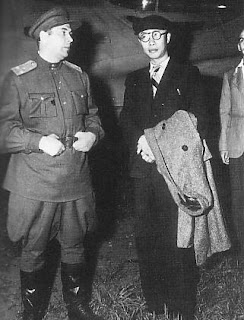Puyi,
después de ser expulsado de la Ciudad
Prohibida, pasó sus años con la ilusión de volver a ser emperador, manejado
por los japoneses y sin tener idea de
los sufrimientos a su alrededor. Fue puesto como jefe de estado del
recientemente formado Manchukuo,
firmó todos los decretos favoreciendo a los
japoneses y fue tomado prisionero por
los soviéticos…
En vocabulario: fete, vivisection
What did the Japanese want creating Manchukuo?
What was Puyi´s role in the new state?
Where did Puyi die?
Why didn´t the
communist kill him?
In 1924, after a
coup that reduced him to a private citizen of the Republic of China, Puyi
was expelled from the Forbidden City.
In 1925, Puyi moved to Tianjin. It was, after Shanghai,
the most cosmopolitan Chinese city,
with large British, French, German,
Russian and Japanese communities.
As an emperor, Puyi was allowed to
join several social clubs that normally only admitted whites.
 |
| Downtown Tianjin |
In 1931 Puyi sent a letter to Jirō Minami, the Japanese Minister of War,
expressing his desire to be restored to the throne. On the night of 18
September 1931, the Mukden Incident
began when the Kwantung Army (the
largest army group of the Imperial
Japanese Army) blew up a section of railroad belonging to the Japanese-owned South Manchurian Railroad company, which was blamed on a Chinese warlord. Using this incident as
an excuse, the Kwantung Army began a
general offensive with the aim of conquering all of Manchuria. Puyi was
proposed as head of a Manchurian state.
Once he arrived
in Manchuria, Puyi discovered that he
was a prisoner and was not allowed outside the Yamato Hotel, ostensibly to protect him from assassination. The Japanese chose as the capital of Manchukuo the industrial city of Changchun, which was renamed Hsinking. Whenever the Japanese wanted a law passed, the
relevant decree was dropped off at Salt
Tax Palace for Puyi to sign,
which he always did. Puyi signed
decrees expropriating vast tracts of farmland to be given to Japanese colonists and a law declaring
certain thoughts to be "thought crimes."
 |
| Manchukuo Palace |
During Puyi's reign as Emperor of Manchukuo, his household was closely watched by the Japanese, who increasingly took
steps toward the full Japanisation of
Manchuria, to prevent him from becoming too independent. He was feted by the Japanese populace during his visits there, but had to remain
subservient to Emperor Hirohito.
More than 10
million Chinese civilians were
mobilized by the Kwangtung Army for
slave labor in Manchukuo under the
supervision of the Kōa-in (a Japanese
agency).
The Chinese slave laborers often suffered
illness due to high-intensity manual labor. Some badly ill workers were
directly pushed into mass graves in order to avoid the medical expenditure and
the world's most serious mine disaster, at Benxihu
Colliery, happened in Manchukuo.
Bacteriological
weapons were experimented on humans by the infamous Unit 731 located near Harbin.
Victims, mostly Chinese, Russians and
Koreans, were subjected to vivisection,
sometimes without anesthesia.
Japanese investments in Manchukuo were
partly financed by selling drugs. The Kōa-in
was directly implicated in providing funds to drug dealers in China for the benefit of the puppet
government of Manchukuo.
Manchukuo's steel production exceeded Japan's in the late 1930s. Many Manchurian
cities were modernized. However, much of the country's economy was often
subordinated to Japanese interests
and, during the war; raw material flowed into Japan to support the war effort. Traditional lands were taken and
redistributed to Japanese farmers
with local farmers relocated and forced into collective farming units over
smaller areas of land.
In December
1941, Puyi followed Japan in declaring war on the United States and Great Britain, but as neither nation had
recognized Manchukuo there were no
reciprocal declarations of war in return.
On 9 August
1945, the Kwantung Army's commander
General Otozō Yamada arrived at the Salt
Tax Palace to tell Puyi that the Soviet Union had declared war on Japan and the Red Army had entered Manchukuo.
Late on the night of 11 August 1945, a train carrying Puyi, his court, his ministers and the Qing treasures left Changchun.
On 16 August Puyi took a small plane to Mukden, where another larger plane was
supposed to arrive to take them to Japan,
but instead a Soviet plane landed. Puyi and his party were all promptly
taken prisoner by the Red Army, who
initially did not know who Puyi was. The
Soviets took him to the Siberian town of Chita. He lived in a sanatorium, then later in Khabarovsk near the Chinese
border, where he was treated well and allowed to keep some of his servants. The
Soviet government refused the Republic of China's repeated requests to
extradite Puyi; the Kuomintang government had indicted him
on charges of high treason, and the Soviet
refusal to extradite him almost certainly saved his life, as Chiang Kai-shek (Chinese nationalist
politician and leader) had often spoken of his desire to have Puyi shot.
 |
| Soviet Union military officer and Puyi |
In 1946, Puyi testified at the International Military Tribunal for the Far
East (a trial that judged the Japanese
war criminals) in Tokyo.
When the Chinese Communist Party under Mao Zedong (chairman of the Communist party) came to power in 1949, Puyi was repatriated to China after negotiations between the Soviet Union and China. Puyi was of considerable value to Mao: "In the eyes of Mao, Puyi,
the last Emperor, was the epitome of
all that had been evil in old Chinese
society."
Puyi
came to Beijing on 9 December 1959
with special permission from Mao Zedong
and lived for the next six months in an ordinary Beijing residence with his sister before being transferred to a
government-sponsored hotel. He had the job of sweeping the streets. He voiced
his support for the Communists and
worked at the Beijing Botanical Gardens.
Puyi
died in Beijing of complications
arising from kidney cancer and heart disease on 17 October 1967 at the age of
61.
Vocabulario
Fete: honour or entertain (someone) lavishly.
She was an
instant celebrity, feted by
the media
Vivisection: the practice of performing operations on live
animals for the purpose of experimentation or scientific research.
Artículos relacionados
Reginald
Johnston arrived in the Forbidden City as Puyi's tutor in 1919. Puyi recalled:
"I have never seen foreign men… The teacher
Robinson was
born as Emanuel Goldenberg to a Yiddish-speaking Romanian Jewish family in
Bucharest… Edward
G. Robinson
… para obligar a los granjeros ucranianos a unirse a
las granjas colectivas los tenían que hambrear… Sobrevivientes
del Holodomor
Esto es parte del archivo: El último emperador chino
No comments:
Post a Comment